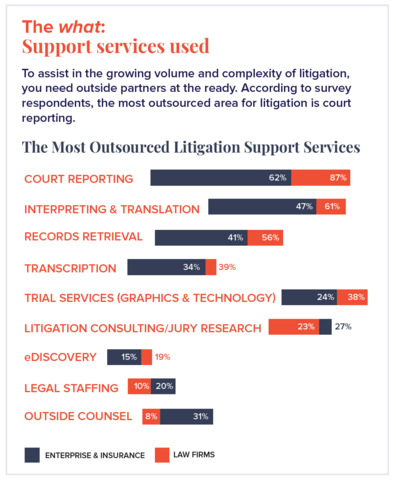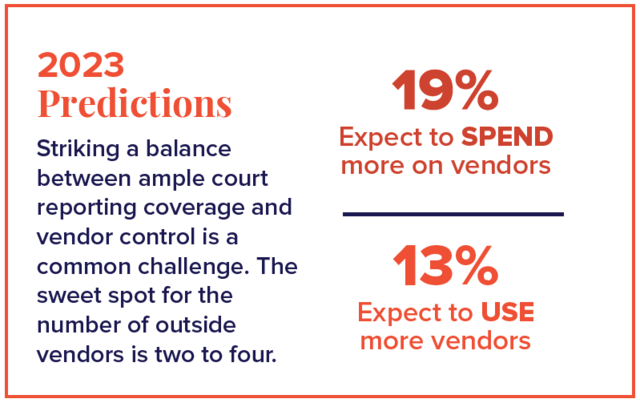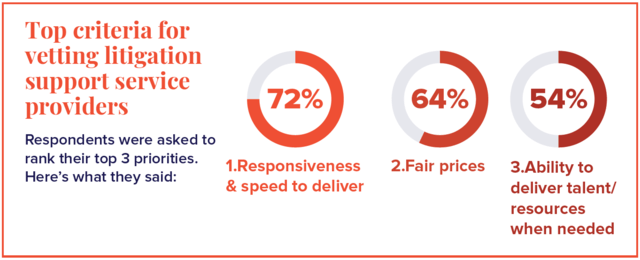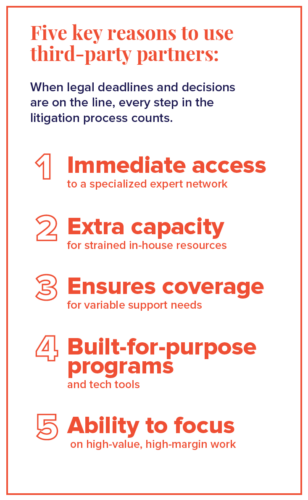Speed and Coverage Ranked as Top Priorities When Selecting Litigation Support Service Providers According to our Annual Survey

Today’s litigation landscape looks vastly different than it did just a few years ago. Technology advancements and remote work have created a seismic shift in how law firms and corporate legal departments operate. In any industry, as in life itself, the only constant is change. Much research has been done on how change impacts the legal industry, but what about the providers that support litigation? With our inaugural Litigation Support Trends survey, we set out to better understand these important relationships.
In August 2022, U.S. Legal Support conducted a survey of 1,173 professionals in the legal and insurance sectors. The statistics were gathered via an online questionnaire and revealed four core themes currently top of mind for the legal industry, including:
- How to vet litigation support providers
- The continued prevalence of remote depositions and remote work in the legal industry
- Heightened cybersecurity awareness
Last week, we covered legal tech trends on our blog, and now we want to discuss what the data revealed about vetting and working with litigation support providers.
Litigation Support: What is it?
Let’s start by defining the term – litigation support — since it’s inherently broad. At U.S. Legal Support, we define litigation support services as, “the outsourced parts of litigation that help keep the wheels of justice turning. Anything from remote depositions, court reporting, interpreting, transcriptions, retrieval of important records, trial consulting and more.”
Results from our survey indicated that court reporting is the most outsourced litigation support area, followed by interpreting, translations, and record retrieval. The market for these services is more mature for law firms than for corporate legal teams, but U.S. Legal Support has documented growing demand for all services in the enterprise market.

Litigation Support Services: Predicted Usage in 2023
The use of litigation support services is an established practice in legal communities. Most organizations expect both spending on and the number of litigation support vendors to stay the same or increase next year.
About one fifth of law firms (19%) say spending is going up next year. These figures are not surprising, considering that 71% of organizations who took our survey say the volume of litigation has held steady or increased since the onset of the pandemic in 2020. With the volume of litigation increasing, 13% of law firms in our survey do expect to use even more vendors than in 2022.

Since litigation support is an intensely demanding, competitive field covering a range of administrative, technical, scientific, design, and consultative services, it makes sense to ensure the outside providers you utilize to complete these services are the best of the best.
The Vendor Cohort and a Growing Shortage
In addition to what we presented in our results infographic, we also asked a few questions in our survey about how many vendors law firms and legal enterprises utilize for court reporting and other litigation support services. Here are some interesting results:
- For most support areas, the sweet spot for the number of outside vendors used is two to four.
- Few firms use only one court reporting vendor or more than 11.
- The larger the firm, the more likely they are to bump up the number of vendors.
About half of law firms use two to four court reporting firms (53%), although nearly a quarter (23%) use five to ten. While five to ten vendors may seem like a lot, striking a balance between national coverage and vendor control was a common challenge for survey respondents and echoes a larger industry trend of widening gap of Stenographers retiring, and new Stenographers entering the workforce.
It makes sense that with the increasing volume of litigation and a nationwide Stenographer shortage, that most law firms would utilize multiple vendors to ensure adequate coverage for depositions and other legal proceedings. The only caveat to using multiple vendors is that cybersecurity risk increases with each external party, particularly if they also leverage 3rd and 4th party vendors to complete their work.
RELATED: Three important ways legal organizations can reign in 3rd and 4th party cyber risk.
Benefits to Outsourcing and Consolidation
In addition to ensuring coverage, a law firm’s ability to navigate future changes is impacted by the professionalism, resourcefulness, and reach of the litigation support partners they work with. There are more than 40,000 court reporting services in the U.S., 5,000+ record retrieval firms; 2,700+ trial consultancies, and countless other specialized litigation support firms – with so many choices, how do you know you’re working with the best ones?
We asked survey respondents what mattered most in a decision to hire a litigation support services provider. Respondents showed us they place the highest value on partnerships that increase productivity and profitability. From our own survey data, the biggest reasons a legal organization selects a litigation support provider are:
- 1) Speed (72% ranked this as their top priority)
- 2) Fair pricing (64% ranked this as a top priority)
- 3) Coverage (54% ranked this as a top priority)

Litigation results can turn on the tiniest detail, and success demands incredible levels of focus, commitment, and work by attorneys under immense pressure. By outsourcing litigation support to a seasoned vendor, this allows attorneys to focus on the highest value aspects of any given case.
Other key benefits include:
- Extra capacity for strained internal resources, particularly for tedious or administrative tasks
- Expedited progression of a case with scalable, rapid response resources
- Access to specialized expertise to prepare for litigation and court appearances

But what if the benefits of outsourcing could be further amplified by consolidating all outside services to just one or two providers? Even amid coverage concerns, growing law firms in multiple locations could exponentially benefit from one preferred provider relationship. As one survey respondent stated, “Our firm is getting larger, and we are looking to streamline things and make it easier for staff to work across different offices.”
In addition to added simplicity, consolidating litigation support services into one vendor that can provide a “one-stop shop” experience enables firms to experience cost savings through both economies of scale and time/cost savings from lessening administrative headaches.
Want to see the full results? Click the button below to download the infographic.
Editoral Policy
Content published on the U.S. Legal Support blog is reviewed by professionals in the legal and litigation support services field to help ensure accurate information. The information provided in this blog is for informational purposes only and should not be construed as legal advice for attorneys or clients.

